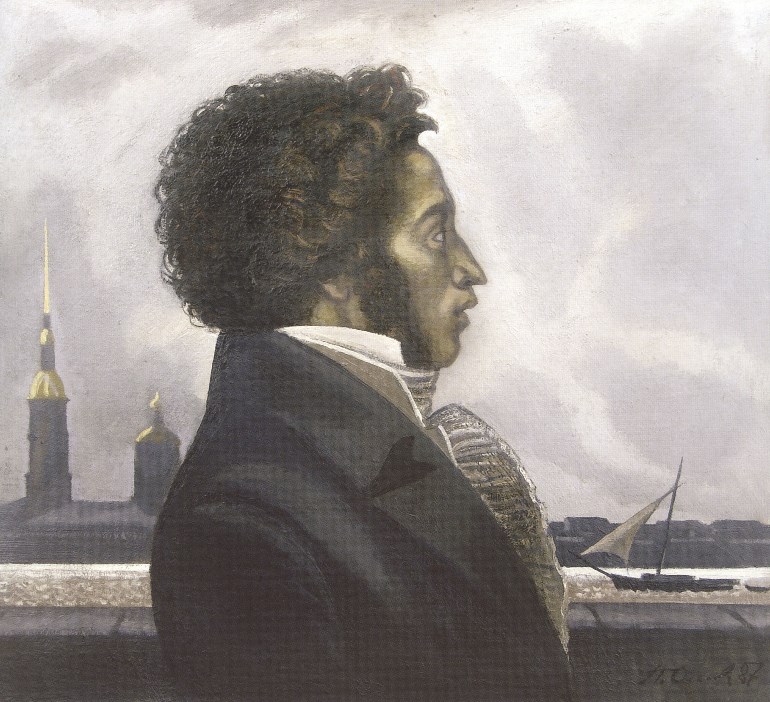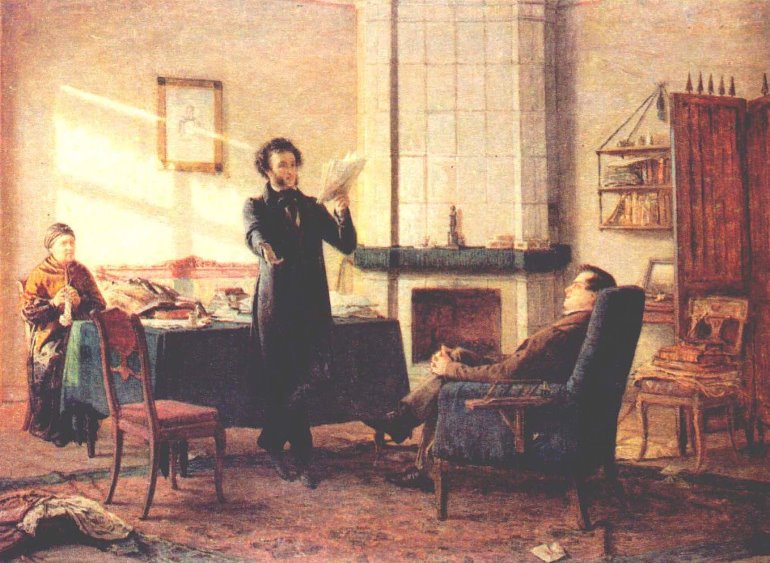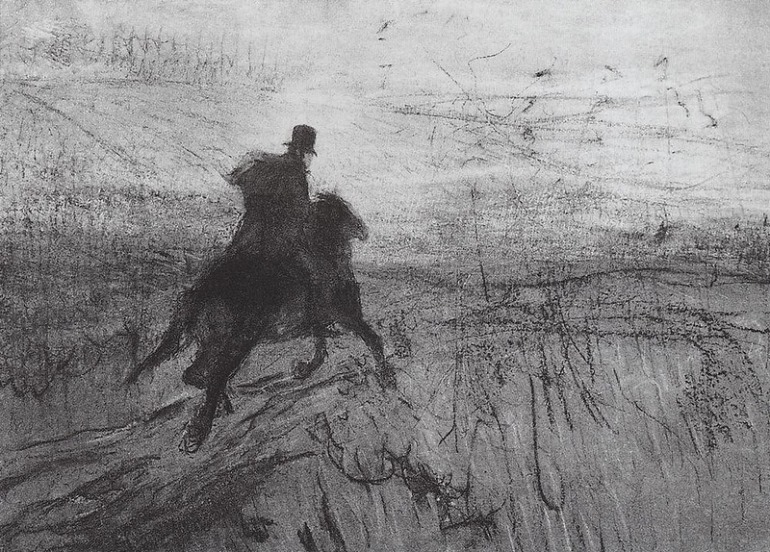
Bonjour, Pouchkine!
/ Главная / Russkiy Mir Foundation / Publications / Bonjour, Pouchkine!Bonjour, Pouchkine!
Tamara Skok
According to contemporaries of Alexander Pushkin, impression that his voice and laughter made on people was one of a kind. We have picked out some memories about meeting Pushkin in his lifetime.

Portrait of A. S. Pushkin by Petr Ossovskiĭ, 1987
***
“Soon we sat around him, and he recited us his The Gypsies. We heard this wonderful poem for the first time, and I will never forget the admiration that filled my soul!.. I was delighted by both - the fluent verses of this wonderful poem, as well as his recitation which was so much melodious that I was melting with pleasure; he had a soft and songful voice, and, just as he says about Ovid in The Gypsies: And a voice, similar to the sound of the waters.”
Anna Kern
***
“Having entered the waiting room of Pletnyov’s apartment, I saw a man of medium height who had already put on his overcoat and hat. While bidding farewell to the host, he exclaimed in a sonorous voice: “Yes! Yes! Our ministers are a beauty! Well, I declare!" Then he laughed and left. I only had a chance to make out his white teeth and lively, agile eyes. Imagine my grief when I later found out that it had been Pushkin.”
Ivan Turgenev
***
“Hidden within the Lyceum walls, he made his clear voice be heard from there through beautiful verses.”
Ekaterina Raevskaja
***
“It is impossible to describe the effect that recitation had on all of us. We came together to listen to Pushkin. Having been brought up on the verses by Lomonosov, Derzhavin, Kheraskov, Ozerov, we knew all of them by heart. [Merzlyakov was our teacher]. Let us also recall the way of recitation that prevailed back then. It was a chant bequeathed by French-style rant. And finally, the one must imagine the very physique of Pushkin. The majestic oracle of high art that we had expected was a man of average, almost low height. He had long hair with light curls at the ends, lively, agile eyes, and a quiet, pleasant voice. He was a dapper person without any pretension dressed in a black frock coat, a black vest with all buttons up and a loose tie. Instead of pompous language fit for gods, we heard a simple, clear, common, and yet poetic, fascinating speech! We listened to the first passages quietly and calmly, or, rather, in some kind of bewilderment. But as he proceeded, the sensations became more intense. The episode about the chronicler and Grigory overwhelmed everyone... And when Pushkin got to Pimen’s story about Ivan the Terrible visiting Kirillov Monastery, about monks praying: “May God grant peace to his suffering and restless soul,” we all seemed to become unconscious. Some people went hot, others had chills. Our hair stood on end. There was no more power to control temper. Someone could suddenly jump up or cry out. Silence turned into outbreak of exclamations, for instance, with the verses of the False: "The shadow of the Terrible adopted me." The recitation was over. We looked at each other for a long time and then rushed to Pushkin. It was time for hugs. Noise was increasing; laughter was pealing out. There were tears running down and congratulations flowing. Evan, Evoe, give the cups!.. Then champagne was brought in, and Pushkin got inspired seeing his impact on this youth of noble birthright. He was pleased with our excitement. Adding woods to fire, he went on reciting Songs about Stenka Razin, how he sailed on his sharped-nosed boat on the Volga at night; the introduction to Ruslan and Lyudmila: “There’s a green oak-tree by the shores of the blue bay” ... After that Pushkin spoke about the plan of False Dmitry, the executioner that joked with the mob next to the block on Red Square while waiting for Shuysky, about Marina Mniszech with False Dmitry, the episode that had been written while riding and then half forgotten, which he deeply regretted. Oh, what an amazing morning it was, with the imprint to last a lifetime. I cannot recall how we left, how we ended the day, how we went to bed. Yes, I don’t think any of us slept that night as our whole beings had been dazed that much.”
Mikhail Pogodin

Pushkin in the village Mihaylovskoye by Nikolai Ge, 1875
***
“My brother and I went every day to swim in a large bathing-place built on the Neva River in front of the Summer Garden; once, flopping about in the water and swimming back then with difficulty, I didn’t notice that a curly-haired man swam up to me and said clearly and friendly: “Let me show you how to swim, you swing your arms in a wrong way, you should do it like a frog,” and then the curly-haired man began to show us a real style...
At the Peterhof feast, the Tsar with the royal family and courtiers rode in a carriage and, having noticed Pushkin walking along the road, shouted to him, “Bonjour, Pouchkine!” “Bonjour, Sir!” Pushkin answered respectfully, but in a laid-back manner.”
S.Sukhotin
***
“When I started reading him the first chapters of Dead Souls, Pushkin was getting more and more gloomy, and finally became as black as sin. When the reading was over, he said in a voice full of sorrow: “Oh God, how sadful our Russia is!”
Nikolai Gogol
***
“When Pushkin laughed, sound of his voice had the same captivating effect as his poems.”
Aleksey Khomyakov
***
“Lev Sergeyevich Pushkin... suddenly burst out with his lively, throaty laughter, extremely similar, as he himself said, to his brother’s one.”
Boleslav Markevich
***
“Pushkin was not good looking: he was somewhat dark-complexioned with irregular features, but it was impossible to imagine more expressive, livelier and more speaking face and to hear more pleasant and more harmonious voice, as if it had been deliberately created for his poems...”
Yelizaveta Drashusova

Pushkin in the village by Valentin Serov, 1899
***
“As soon as I entered again the waiting room, I heard Pushkin's voice. He shouted: “Vasily, is that you? “
“That’s right, it’s me,” the cook answered.
“And what about Mr. Oblachkin?”
“Here I am.”
“This way, please!”
Pushkin called me, and his voice was so cordial and so pleasant that I trembled with joy and will never forget such a happy moment for me. I bowed to Pushkin very clumsily. I remember being absolutely confused and embarrassed, although he addressed me in a very kind and simple way; his voice was amazingly pleasant, his smile was good-natured, his eyes looked with compassion... Why was I that timid in front of such a person to whom I should feel love and respect only? I was a boy then, but I understood very well that my poems were in the hands of a celebrated poet. “Now, be sure,” he said very seriously “to write the request in prose, not verse.” I couldn’t help but smiled. Pushkin noticed my smile and laughed out loud, light-heartedly, with admirable cheerfulness: “I made this remark about the request because I had once written in verse an official document on a stamped paper and it was not accepted in a government office.”
Oblachkin (V.Makarov)
***
“He was brought home; his wife and her sister, Alexandrina, were already anxious; but only Aleksandrina knew of his letter to Heeckeren’s father. He shouted with a firm and strong voice that his wife should not come into his library, where he had been put, and she was told that he had been wounded in the leg. (Alexander Turgenev).
“Who is there?” he asked Spassky and Danzas. They called my name and Vyazemsky’s.
“Call them over,” he said in a weak voice. I approached him, took his outstretched hand, which had become cold, and kissed it. I was not able to tell him anything, he gave a wave, and I walked away.
…
Still, in the middle of our conversations, his voice seems to be responding, as if his lively, childishly cheerful laugher is heard.
He once asked: "What time is it?" and after Dal’s response he continued in a faltering voice: "How long ... should I ... suffer so much?.. Please, make it fast!.." Actually (after torments of the first night, which had lasted for two hours), he was extremely patient.
…
She came, knelt at the head of the bed, gave him a spoon or two of cloudberries, and then pressed her face against his; Pushkin pated her head and said: “There, there, everything is fine; thank God; all is well! Go." His calm expression and firm voice deceived the poor wife.”
Vasily Zhukovsky
New publications

 Mikhail Kalatozov, a director who transformed the world of cinematography in many ways, was born 120 years ago. He was a Soviet film official and a propagandist. Above all, he was capable of producing movies that struck viewers with their power and poetic language.
Mikhail Kalatozov, a director who transformed the world of cinematography in many ways, was born 120 years ago. He was a Soviet film official and a propagandist. Above all, he was capable of producing movies that struck viewers with their power and poetic language.  Ukrainian authorities have launched a persecution campaign against the canonical Ukrainian Orthodox Church (UOC), the biggest one in the country's modern history. Over the past year, state sanctions were imposed on clergy representatives, searches were conducted in churches, clergymen were arrested, criminal cases were initiated, the activity of the UOC was banned in various regions of the country, and monasteries and churches were seized.
Ukrainian authorities have launched a persecution campaign against the canonical Ukrainian Orthodox Church (UOC), the biggest one in the country's modern history. Over the past year, state sanctions were imposed on clergy representatives, searches were conducted in churches, clergymen were arrested, criminal cases were initiated, the activity of the UOC was banned in various regions of the country, and monasteries and churches were seized.  When Nektary Kotlyaroff, a fourth-generation Russian Australian and founder of the Russian Orthodox Choir in Sydney, first visited Russia, the first person he spoke to was a cab driver at the airport. Having heard that Nektariy's ancestors left Russia more than 100 years ago, the driver was astonished, "How come you haven't forgotten the Russian language?" Nektary Kotlyaroff repeated his answer in an interview with the Russkiy Mir. His affinity to the Orthodox Church (many of his ancestors and relatives were priests) and the traditions of a large Russian family brought from Russia helped him to preserve the Russian language.
When Nektary Kotlyaroff, a fourth-generation Russian Australian and founder of the Russian Orthodox Choir in Sydney, first visited Russia, the first person he spoke to was a cab driver at the airport. Having heard that Nektariy's ancestors left Russia more than 100 years ago, the driver was astonished, "How come you haven't forgotten the Russian language?" Nektary Kotlyaroff repeated his answer in an interview with the Russkiy Mir. His affinity to the Orthodox Church (many of his ancestors and relatives were priests) and the traditions of a large Russian family brought from Russia helped him to preserve the Russian language.

 The leaders of the Friends of the Great Russia cultural association (Amici Della Grande Russia) in Italy believe that the Western policy of abolishing Russian culture in Europe has finally failed. Furthermore, it was doomed to failure from the beginning.
The leaders of the Friends of the Great Russia cultural association (Amici Della Grande Russia) in Italy believe that the Western policy of abolishing Russian culture in Europe has finally failed. Furthermore, it was doomed to failure from the beginning.  Name of Vladimir Nemirovich-Danchenko is inscribed in the history of Russian theater along with Konstantin Stanislavski, the other founding father of the Moscow Art Theater. Nevertheless, Mr. Nemirovich-Danchenko was a renowned writer, playwright, and theater teacher even before their famous meeting in the Slavic Bazaar restaurant. Furthermore, it was Mr. Nemirovich-Danchenko who came up with the idea of establishing a new "people's" theater believing that the theater could become a "department of public education."
Name of Vladimir Nemirovich-Danchenko is inscribed in the history of Russian theater along with Konstantin Stanislavski, the other founding father of the Moscow Art Theater. Nevertheless, Mr. Nemirovich-Danchenko was a renowned writer, playwright, and theater teacher even before their famous meeting in the Slavic Bazaar restaurant. Furthermore, it was Mr. Nemirovich-Danchenko who came up with the idea of establishing a new "people's" theater believing that the theater could become a "department of public education."  "Russia is a thing of which the intellect cannot conceive..." by Fyodor Tyutchev are famous among Russians at least. December marks the 220th anniversary of the poet's birth. Yet, he never considered poetry to be his life's mission and was preoccupied with matters of a global scale. Mr.Tyutchev fought his war focusing on relations between Russia and the West, the origins of mutual misunderstanding, and the origins of Russophobia. When you read his works today, it feels as though he saw things coming in a crystal ball...
"Russia is a thing of which the intellect cannot conceive..." by Fyodor Tyutchev are famous among Russians at least. December marks the 220th anniversary of the poet's birth. Yet, he never considered poetry to be his life's mission and was preoccupied with matters of a global scale. Mr.Tyutchev fought his war focusing on relations between Russia and the West, the origins of mutual misunderstanding, and the origins of Russophobia. When you read his works today, it feels as though he saw things coming in a crystal ball...